Homeless in Ybor: A day in the life
Move often, retreat quickly, trust takeout boxes and keep track of bathrooms and water fountains.
Hillsborough County’s public schools saw a sharp increase in the number of homeless students this past year, up to 3,124 after three years of hovering around 2,000.
With colleges having less control over adult students’ lives, their statistics are less precise but almost as alarming. Nationwide, 47,204 students self-identified as homeless when they applied for financial aid in 2009.
There are people who attend class and maintain grades, then spend nights searching for a place to sleep and something to eat. There’s nothing distinguishing about them. They’re college students.
Daniel Kadyk, Michael Madison and Trevor Wood planned a three-day stint where we’d live on the streets ofYbor City. We set out to get a taste of what these individuals endure and see if we could learn something about their resourcefulness. The following, as told by Madison, is an account of what ensued.
• • •
There’s something intriguing about the duality behind Ybor City’s culture. Historic sites sit on the same streets as night clubs and the homeless read the Tampa Bay Times on benches in front of pizzerias. The amateur sociologist in me started this trip excited to learn as much as we could.
The 30 to 40 degree weather on the weekend of Gasparilla 2011’s Sant’ Yago Knight Parade shredded the group’s optimism within hours.
The cold weather was somewhat expected and I made some purchases (thrift stores only) in order to prepare myself for it. Florida’s usual swampy climate has robbed us of cold weather survival instincts, so there was no talk of bringing sleeping bags. The only things on us were the clothing we set out with and bags stuffed with pens, notebooks, cameras and empty water bottles.
We didn’t have any trouble filling the bottles, or for that matter, finding places to pee.
• • •
After beginning the trip late Thursday a few blocks north of Centro Ybor, we immediately began searching for a place to sleep. We decided to stop in the central square of the Ybor City State Museum, where Daniel and Trevor got some sleep while I kept watch.
Police cars kept driving by and I started to feel paranoid. At least at first, not having anywhere to go makes you feel as though you’re inherently doing something wrong. I began wondering if we were loitering, so I took a walk around the square’s perimeter.
There was a sign stating that the area closed at dusk. On the bright side, the sign also indicated there was a bathroom open until 4 a.m. all weekend. Always good to know where your bathrooms are.
Daniel and Trevor suggested moving to a different spot to stay throughout the night. Prior to setting out, I’d done some snooping around and knew of a staircase to sleep under and remain relatively unseen.
The staircase was (just about) everything we’d hoped. There were shells and concrete in the dirt, which was littered with empty packs of cigarettes and flattened beer cans. I don’t think we were the first people to discover the area.
I didn’t care. The area was somewhat sheltered from the wind, out of sight and had concrete to lie down on. We napped.
The three of us were visibly shaken when we woke a few hours later. There’s something uncanny about sleeping on cold concrete. No matter how comfortable or warm you can get before passing out, when you wake up the cold will have made its way into your bones.
• • •
I was hungry and decided it was a perfect time to try dumpster diving for food or whatever else we could find.
We started moving through the alleys. I borrowed the pocket knife Trevor had brought along and began slicing open garbage bags. The first major find was a Burger King bag with some icy fries, but I wasn’t hungry enough for that yet.
La Segunda Bakery’s air conditioning unit tricked us into believing we had found the cream of the crop, as far as dumpsters go. The real garbage was near an open door and by this time the bakery’s kitchen was open. Alas, we had to keep moving.
Movement was key to our vagabond lifestyle, partially for the paranoia about loitering and also for sanity. When you’re sitting in one spot, it’s clear to passersby that you don’t have anywhere to go. When you stay on the move, each person only gets a glimpse and they don’t know if you’re looking for a great trash bin or you’re just a bunch of 20-somethings taking their grungy style too far.
Many rifled-through bags later, I found something edible: half of a pesto chicken sandwich with bacon, lettuce and some kind of chipotle mayonnaise. The chicken smelled fine and it seemed as if that would be the first thing to spoil. I hadn’t eaten any meat other than fish in about two years and I wasn’t quite hungry enough to dive in. The chicken and bacon went back in the dumpster. My vegetarian half-sandwich was awesome and held me over until the next afternoon.
An hour or so before dawn on Friday morning, security was unlocking the college so we tried to enter the Faculty building to get a bit of rest. A security guard in the faculty parking lot suddenly began yelling and approaching us. Not wanting to be recognized as students, we fled and made our way to a parking garage to ride the elevator while discussing our next move.
By this time silence replaced our enthusiastic planning of the multimedia project that we had hoped this trip would be. We finally began to feel that there was a “homeless” vibe emanating from us as we migrated. The cold had forced a sense of desperation on the whole group, but laughter kept creeping over me for no reason at all. This new state persisted until the end of the trip, but I suspect that over long periods of time it leads to insanity. Hunched over and somewhat delirious, we entered the parking garage.
After a few minutes sitting on the fourth floor, our warm elevator began automatically recalling to the first. I resigned myself to hitting the “4” button each time the elevator dragged us down. This wasn’t a long-term solution.
I have parked on the fourth floor many times and the view of downtown Tampa is fairly scenic. Hoping it would provide some much-needed escape from the reality waiting for us on the ground floor, we exited onto the roof.
Personal belongings were scattered outside over two or three spots on the roof of the garage. After Trevor snapped a picture, a group appeared and began sprinting right for us. They appeared to be wearing matching police academy T-shirts and they didn’t look happy. We had retreated to the elevator when they caught up with us.
“Can we help you?” one of the men asked, almost accusingly.
“No,” I replied firmly, and met his stare for what seemed like minutes. I wasn’t thinking straight. This didn’t seem to satisfy him, and I began to feel threatened. These were not our friends.
“We didn’t touch your stuff, we were just looking for someplace to rest.”
They kept a keen eye on us until our elevator arrived and we hastily made our escape. Elevator “door close” buttons just don’t work quickly enough.
• • •
The second floor of the library is open to the public, so we set off for guaranteed warmth and enough material to keep you busy for years. We slept on benches outside the library until it opened at 8 a.m.
As a night owl that often has to function on a precious few hours of sleep, I felt somewhat refreshed and went into the library to find something to read while Daniel and Trevor went into the reference room to nap on chairs.
I was a quarter of the way through Vonnegut’s Breakfast of Champions when it hit me that I wasn’t able to concentrate and follow the story, even though I was entertained as the pages went by. This inability to focus scared the hell out of me, so I rejoined the group in the reference room.
• • •
Sitting in the reference room, we met Jerome Fudge, an HCC student who has spent the last four years “place to place,” but he said his situation drastically worsened in 2009. Since then, he’s often found himself sleeping in abandoned buildings and occasionally in alleys.
He started at HCC 10 years ago and has managed to keep his student loans down to about two years worth, even though he almost completed a degree at Everest University in between. Now that he’s returned to HCC, he passes a good deal of time in the library studying and doing homework.
Jerome said “most people just want shelter, protection from the elements.” Last year, he stayed at a “5-day free” Salvation Army shelter on Florida Avenue, and used up a one month voucher before setting out again.
He said that the Salvation Army actually made it harder for him to find work because of a curfew (which he said can only be excused if you’re already working) that forced him to look for jobs during the hottest time of day. Without a car, this meant that he’d have to introduce himself to prospective employers after trekking around town between 12:30 p.m. and 3:30 p.m. In Florida.
While he doesn’t keep in touch with his younger siblings or mother, he has a close relationship with an older sister in Philadelphia. She helps when she can by lending him small amounts of money. A godmother in Tampa offers him a place to receive mail and occasionally to get a much-appreciated hot meal.
“If people look at my situation and think it looks bad, some people don’t have a mailing address.”
While the phone calls with his sister keep him connected with others, he prefers not to keep companions with him. I understood this, as bitterness seemed to accompany the silence that had engulfed our group.
Jerome remains somewhat optimistic. He made it clear that he will be ready to get an apartment as soon as he can claim a regular paycheck.
Jerome is being tested to see if he’s eligible for vocational rehabilitation, which he hopes will provide tools and support to get him back to work and in housing.
• • •
After talking to Jerome, Debra Magwood, lead officer at the Ybor City campus, arrived and told me that a librarian had called about an unusual number of homeless people in the library. My partners were sleeping, so we were told to leave. Magwood had become aware of our assignment and said she was the one calling for us earlier from the faculty lot.
I approached two librarians, not identifying myself as a student but trying to look as desperate as possible. I asked if we were allowed to be there, and they admitted to having called because sleeping in chairs made the library “look bad” to students.
We found that when you’re “homeless,” you have to retreat from every battle. Whether it’s police cadets or librarians in a public library, when confronted, you have to surrender and retreat quickly. If you don’t back down, the police will be called and you will lose.
We left the library hunched over and defeated, prepared to spend an entire day trying satisfy our empty stomachs.
Staff writer Daniel Kadyk contributed to this outlandish experiment.

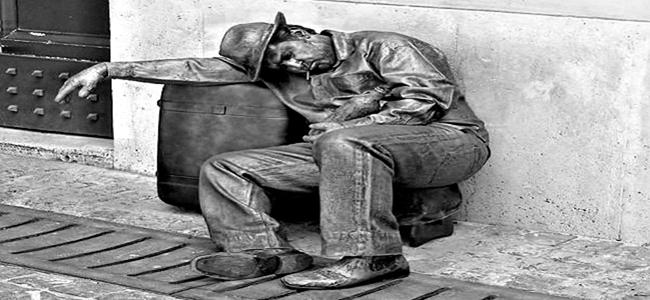
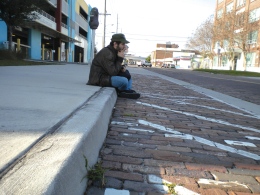
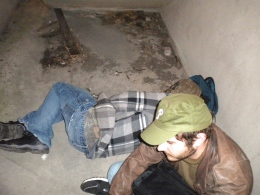
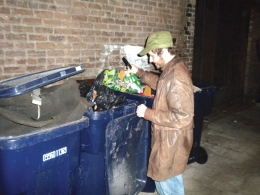

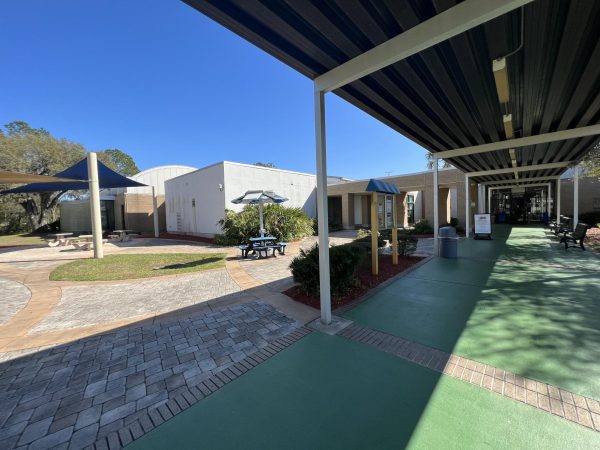
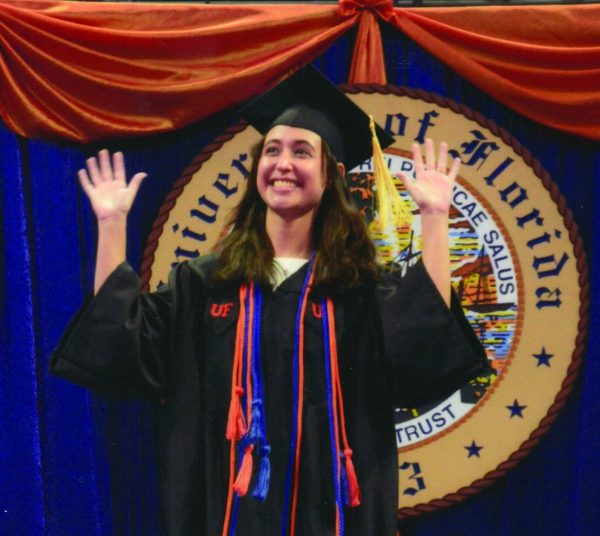
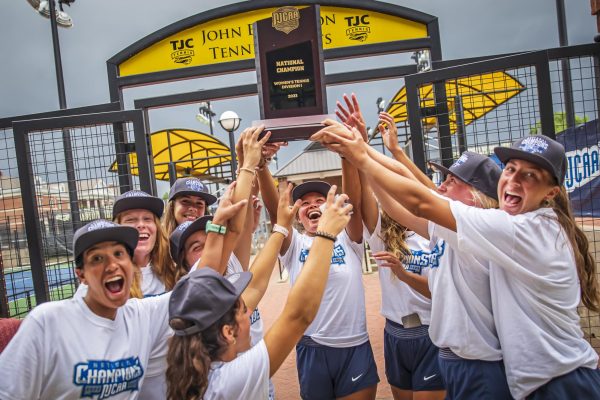
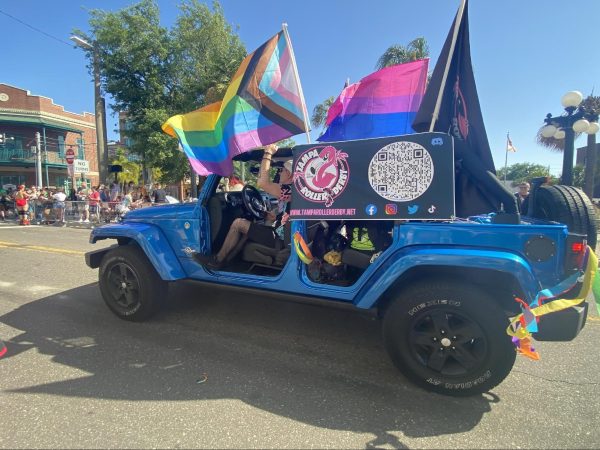





Isreal Stapf • Feb 10, 2012 at 4:47 pm
Hey, came across your website via a online community I visit regularly, and was wanting to know if I might use the webpage as a source in one of my own web-sites. All the credit would be supplied to the original website, i.e. : https://www.hawkeyenews.net/news/2011/11/16/homeless-in-ybor-a-day-in-the-life/ . Would appreciate it, so please contact me personally at my email in case I cannot: Warmbrodt@gmail.com . Thanks a bunch 🙂
Earle Morfee • Feb 10, 2012 at 2:29 pm
I dugg some of you post as I cerebrated they were very helpful very beneficial
bathrooms • Feb 9, 2012 at 10:24 am
Pretty good post. I just stumbled upon your blog and wanted to say that I have really enjoyed reading your blog posts. Anyway I’ll be subscribing to your feed and I hope you post again soon.
Trinidad Haddock • Feb 8, 2012 at 4:15 pm
I believe other website owners should take this web site as an example , very clean and wonderful user friendly pattern . “Sometimes the road less traveled is less traveled for a reason.” by Jerry Seinfeld.
joe • Dec 7, 2011 at 1:37 am
Truly entertaining blog. This is a very interesting article. Cheers again – I will come again.